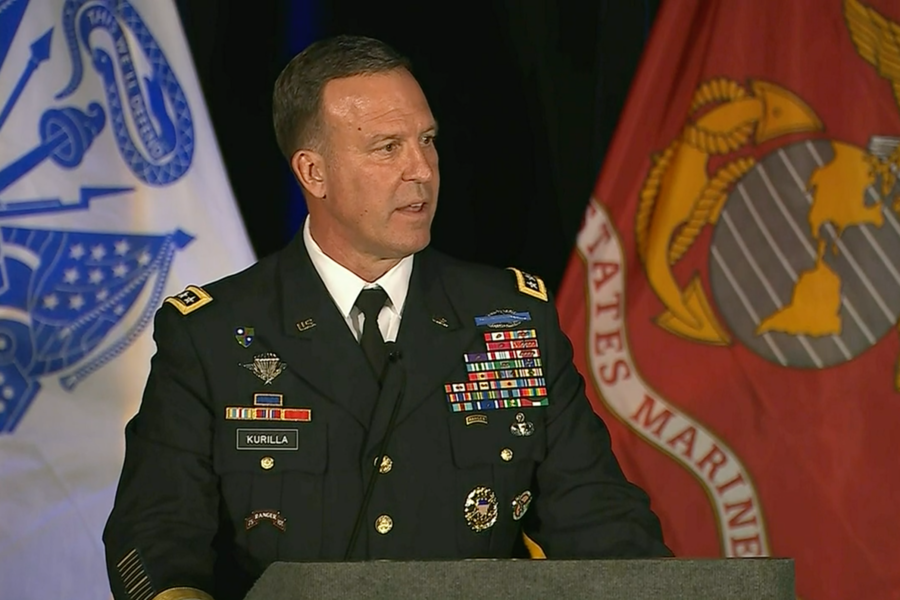Army Gen. Michael “Erik” Kurilla took command of U.S. Central Command on April 1, formally succeeding Marine Corps Gen. Kenneth F. McKenzie Jr. in a ceremony in Tampa, Fla.
Kurilla’s ascension to the head of CENTCOM comes at a potentially key moment for the combatant command. The Pentagon has increasingly emphasized competition with China as the nation’s “pacing challenge,” and the invasion of Ukraine has brought renewed focus to Europe and the “acute threat” Russia presents. After more than 20 years of war in Afghanistan, the U.S. has left, reducing its presence in the region.
Despite all this, Kurilla argued in the first few moments after taking command, the U.S. “must remain fiercely and actively engaged in the 21 countries of Central Command.”
“Our adversaries are watching closely for any sign that America’s commitment to the collective security of the region is wavering,” Kurilla warned. “Our adversaries are poised to capitalize on any opportunities that emerge. We must not grant them any.”
Kurilla also made the case for the Defense Department to continue investing in the region, pointing to both its strategic importance and future threats.
“We must ensure a favorable balance of power in the region. CENTCOM must maintain the requisite resources to find, fix, and finish threats to the homeland before those threats develop the capability to conduct external operations; to secure maritime straits and global trade routes; to ensure the free flow of commerce through the region,” Kurilla said.
Kurilla’s comments echoed those made by Defense Secretary Lloyd J. Austin III, who spoke at the ceremony and addressed the service members serving in CENTCOM directly.
“This region is where we protect waterways so that global commerce can flow. It’s where we fight terrorists who threaten our citizens. And it’s where we work with our partners to confront instability from Iran and its proxies,” Lloyd said. “CENTCOM is central to our security. It’s central to our readiness. And it’s central to our mission.”
In the short term, Austin said, CENTCOM will continue to focus on intelligence sharing and regional air defense, a nod to the recent airstrikes by Iranian-backed militias on American allies such as Saudi Arabia and the United Arab Emirates—in some cases, the strikes have even targeted bases with U.S. personnel.
In his confirmation hearing before the Senate Armed Services Committee, Kurilla, who previously served as chief of staff of CENTCOM, stressed the importance of both human and artificial intelligence in countering Iran.
In the longer term, Austin said, “we’ll work together to tackle Iran’s use of missiles and its proliferation of unmanned aerial systems. And we’ll keep standing strong with our partners to hold Iran and its proxies accountable.”
The threat from Iran was consistently cited by Kurilla’s predecessor, McKenzie, as the primary concern for CENTCOM. But the course of his three-year tenure was marked by several other key moments—in particular, Austin highlighted Israel’s transition to the area of responsibility, the transition to an advise-and-assist role in Iraq, and the non-combatant evacuation out of Afghanistan that rescued more than 124,000 people but resulted in the deaths of 13 service members in a suicide bombing.
Austin, McKenzie, and Chairman of the Joint Chiefs Gen. Mark A. Milley all made reference to the Afghanistan airlift and the lives lost in their remarks.
“Since I assumed command in March of 2019, CENTCOM has suffered 43 killed and 468 wounded in action,” McKenzie said. “Every one of these lives altered or lost in the line of duty has profoundly affected me, and how could they not? Again, there’s a very steep price associated with the task that we set before ourselves here.”
Still, McKenzie called serving as the commander of CENTCOM the “greatest honor of my career,” and noted that the mission in Afghanistan achieved its core objective.
“It’s worth remembering that we went to Afghanistan to prevent another terrorist attack on our homeland. And we’ve done so. That there has not been another 9/11 in the 21 years since is no accident,” McKenzie said. “It’s a testament to the perseverance and devotion of the men and women of CENTCOM, as well as to the perseverance and devotion of our allies and partners that have served with us in that country.”
Milley, for his part, credited McKenize for guiding CENTCOM, “and by extension the nation, through some of our most tough times.”
“These last few years have been quite intense,” said Milley. “Frank and I have talked a lot—almost daily, and on many occasions, multiple times a day. Countless phone calls, meetings, VTCs, and endless discussions. Very emotional, very strategic, very heartfelt. I have personally an incredible amount of trust, confidence, and personal respect for Frank McKenzie.”
In 2005, as a lieutenant colonel, Kurilla was wounded in Iraq during a firefight, getting shot three times and suffering a shattered femur, Milley said.
“He recovered fast enough to pass the 75th Ranger Regiment assessment and continue jumping out of airplanes,” Milley added. “You can knock Erik Kurilla down, but you can’t keep him down.”
Most recently, Kurilla served as commander of the Army’s 82nd Airborne Division at Fort Bragg, N.C., which deployed thousands of Soldiers to Afghanistan as part of the evacuation process.
“If there ever was some way to feed into a machine the requirements for the perfect leader of CENTCOM—the character traits, the attributes, the experiences, the knowledge, and the personality that will be ideal—that machine would spit out Erik Kurilla,” Milley said.

